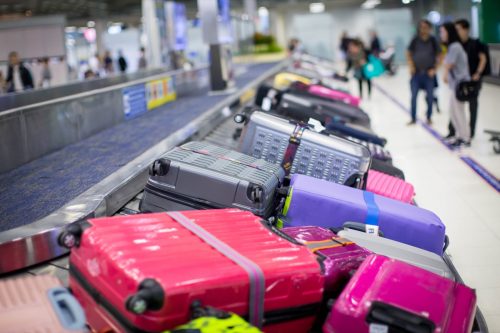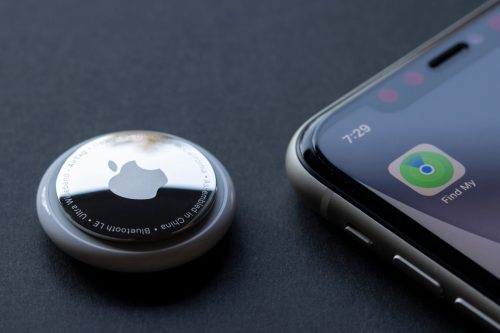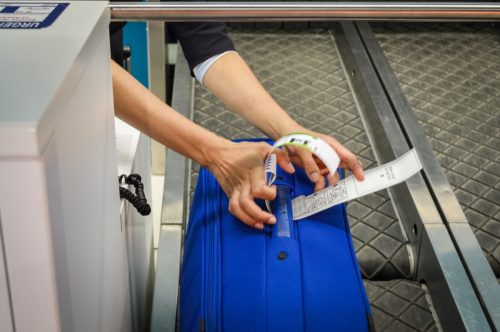Some flyers are adept at packing everything they need in a carry-on bag or even a smaller personal item, while others need to check a bag, especially for longer trips—or just because our liquids are bigger than the Transportation Security Administration (TSA) will allow. But when you do check baggage, you’re placing an awful lot of trust in the airline to keep track of your belongings. Unfortunately, checked bags do get misplaced or lost, and it happens more often than we’d like to believe. Now, travel experts have a recommendation that could give you peace of mind. Read on to find out what they suggest adding to your baggage before your next big trip.
READ THIS NEXT: Never Do This After Checking a Bag, Flight Attendant Says.

Lost baggage is nothing new, but lately, the airline industry has been facing considerable challenges as it continues to deal with the effects of the pandemic. Flight cancellations and delays have been in the spotlight, but lost and delayed luggage has been a problem as well.
According to Bloomberg, mishandled luggage incidents in the U.S. increased by 60 percent from April 2021 through March 2022, when compared with the same timeframe a year prior. In April 2022 alone, 220,000 bags were “mishandled” by different U.S. airlines, CNBC reported, citing data published by the U.S. Department of Transportation.
“Unfortunately, lost luggage isn’t extremely uncommon, and it can really put a damper on your traveling experience,” Josh Wright, CEO of CellPhoneDeal, tells Best Life. “In many cases, airline companies might not have a great idea of where your lost luggage has gone, since it was ultimately supposed to go where you went.”
With that in mind, you might have some concerns the next time you watch your luggage disappear behind the check-in counter at the airport. Thankfully, there’s something you can add when you’re packing that will lower your odds of losing it forever.

Apple released a new product in April 2021, and it wasn’t a next-generation iPhone or iPad. It was the Apple AirTag: These small, round tags offer a simple way to keep track of your belongings, whether that’s your keys, wallet, bike, or yes, even your luggage.
“The tracking technology within the AirTag sends a Bluetooth signal of the bag’s location to the ‘FindMy network’ that is used by Apple,” Kristin Lee, owner and author of the travel blog Global Travel Escapades, explains.
“Therefore, if you ever lose your bag or want to know where it is in the airport process, you simply look at your ‘FindMy’ app on your Apple phone, tablet, or computer,” she says. “Once you find it, you can go to airport staff, show them your bag’s location through the app, and this will expedite the retrieval process.”
The devices are both safe and legal, and while your luggage could still end up “lost,” AirTags add a layer of insurance that they can be found.
For more travel advice sent straight to your inbox, sign up for our daily newsletter.

Apple AirTags will run you $29 for one or $99 for four, which may sound reasonable, depending on how much you value the extra security.
“For me using AirTags serves two purposes,” Becky Moore, founder of the travel blog Global Grasshopper, says. “First, it means that if the worst should happen and your luggage does get misplaced, there is a plan in place to track it down. And while there is no guarantee, it does vastly increase the odds in your favor.”
“The second reason is simply for peace of mind,” Moore adds. “I always travel with much less anxiety knowing my AirTags are silently, yet productively putting my luggage’s best interests first!”
In the instance the airline can’t identify the owner of a lost bag, an AirTag can help in that situation as well, she says.

These devices are incredibly useful, according to travel experts, but they’re not foolproof. AirTag batteries normally last a year, and if your battery dies while you’re traveling, you’re out of luck when it comes to tracking.
You also won’t have much success tracking your bag if you’re traveling to a “highly remote location” where there are no nearby Apple devices to relay the Bluetooth signal, Lee says. And according to 9to5Mac, you also won’t be able to track your bag with an AirTag while it makes its way through the airport’s conveyer belt system, as the Apple technology isn’t well-equipped to track objects in motion.
That being said, experts say it’s probably still worth it to throw an AirTag in your bag. “Ultimately, Apple AirTags are an industry standard and travel essential nowadays,” Lee says, adding that she even puts one in her carry-on bag.
“Flights are often overbooked, cabin space is limited, and airport staff will often announce that some carry-on bags must be checked in at the gate,” she explains. “It’s better to be safe than sorry.”




